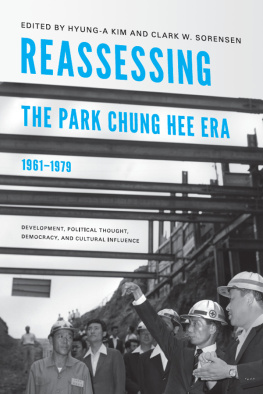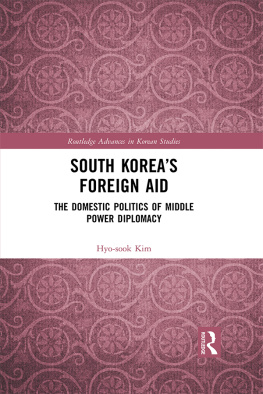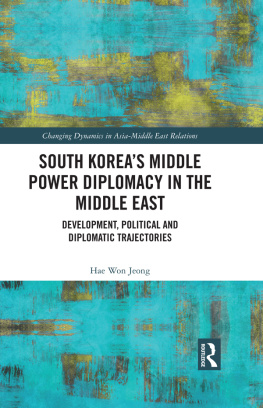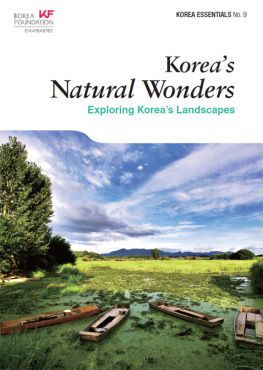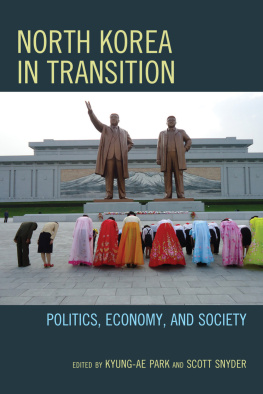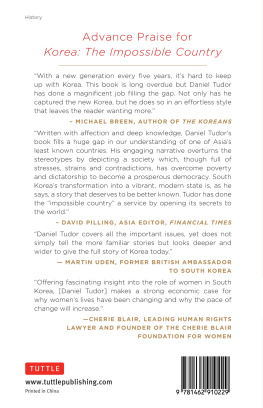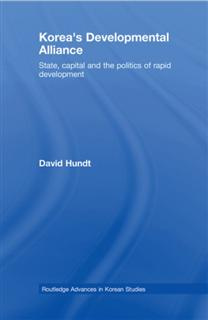
KOREA'S DEVELOPMENT UNDER
PARK CHUNG HEE
Based on personal interviews with the principal policy-makers of the 1970s, Korea's Development under Park Chung Hee examines how the president sought to develop South Korea into an independent, autonomous sovereign state both economically and militarily. Kim brings a new narrative to the complex task of exploring the paradoxical nature and effects of Korea's rapid development which maintains that any judgment of Park must consider his achievements in the socio-economic, cultural and political context in which they took place.
Aspects of Park's government analyzed include:
his abhorrence of Korea's reliance on US aid;
the Korean model of state-guided industrialization;
Park's rapid-development strategy;
the role of the ruling elites;
Park's clandestine nuclear development program;
the heavy and chemical industrialization of the 1970s.
The prevailing popularity of Park in the eyes of the Korean public is significant and relevant to their acceptance of how their national development was achieved. This book tells that story while simultaneously recognizing the flaws in the process. With a great deal of material never before published, scholars of Korean politics and history at all levels will find this book a stimulating account of South Korea in the 1960s and 1970s.
Kim Hyung-A is a Research Fellow at the Centre for Asia Pacific Social Transformation Studies (CAPSRTANS), University of Wollongong, Australia.
ROUTLEDGECURZON/ASIAN STUDIES
ASSOCIATION OF AUSTRALIA (ASAA)
EAST ASIA SERIES
Edited by Tessa Morris-Suzuki and Morris Low
Editorial Board: Dr. Gemerie Barm (Australian National University), Professor Colin Mackerras (Griffith University), Professor Vera Mackie (Curtin University), and Associate Professor Sonia Ryang ( Johns Hopkins University).
This series represents a showcase for the latest cutting-edge research in the field of East Asian studies, from both established scholars and rising academics. It will include studies from every part of the East Asian region (including China, Japan, North and South Korea and Taiwan) as well as comparative studies dealing with more than one country. Topics covered may be contemporary or historical, and relate to any of the humanities or social sciences. The series is an invaluable source of information and challenging perspectives for advanced students and researchers alike.
RoutledgeCurzon is pleased to invite proposals for new books in the series. In the first instance, any interested authors should contact:
Professor Tessa Morris-Suzuki
Division of Pacific and Asian History
Research School of Pacific and Asian Studies
Australian National University
Canberra, ACT 0200
Australia
Dr. Morris Low
Department of Asian Language and Studies
University of Queensland
Brisbane, Queensland 4072
Australia
RoutledgeCurzon/Asian Studies Association of Australia (ASAA) East Asia Series
1 GENDER IN JAPAN
Power and public policy
Vera Mackie
2 THE CHAEBOL AND LABOUR IN KOREA
The development of management strategy in Hyundai
Seung Ho Kwon and Michael O'Donnell
3 RETHINKING IDENTITY IN MODERN JAPAN
Nationalism as aesthetics
Yumiko Iida
4 THE MANCHURIAN CRISIS AND JAPANESE SOCIETY,
193133
Sandra Wilson
5 KOREA'S DEVELOPMENT UNDER PARK CHUNG HEE
Rapid industrialization, 196179
Kim Hyung-A
KOREA'S DEVELOPMENT
UNDER
PARK CHUNG HEE
Rapid industrialization, 196179
Kim HyungA
First published 2004
by RoutledgeCurzon
11 New Fetter Lane, London EC4P 4EE
Simultaneously published in the USA and Canada
by RoutledgeCurzon
29 West 35th Street, New York, NY 10001
This edition published in the Taylor & Francis e-Library, 2005.
To purchase your own copy of this or any of Taylor & Francis or Routledge's
collection of thousands of eBooks please go to www.eBookstore.tandf.co.uk.
RoutledgeCurzon is an imprint of the Taylor & Francis Group
2004 Kim HyungA
All rights reserved. No part of this book may be reprinted or
reproduced or utilized in any form or by any electronic, mechanical,
or other means, now known or hereafter invented, including
photocopying and recording, or in any information storage or
retrieval system, without permission in writing from the publishers.
British Library Cataloguing in Publication Data
A catalogue record for this book is available from the British Library
Library of Congress Cataloging in Publication Data
Kim, Hyung-A, 1948
Korea's development under Park Chung Hee : rapid
industrialization, 1961-1979 / Hyung-A, Kim.
p. cm. (RoutledgeCurzon/Asian Studies Association of Australia
(ASAA) East Asia series ; 5)
1. Park, Chung Hee, 19171979. 2. Korea (South)Politics
and government19601988. 3. Korea (South)Economic policy
1960 4. PresidentsKorea (South) I. Title. II. Series:
RoutledgeCurzon/Asian Studies Association of Australia East Asia
series ; 5.
DS922 .42. P34K547 2004
951.95043dc21
2003009875
ISBN 0-203-35642-X Master e-book ISBN
ISBN 0-203-38722-8 (Adobe eReader Format)
ISBN 0415323290 (Print edition)
For my mother, Yi Kmwl
and
My son, Eugene Gregory van Leest
CONTENTS
PART I
Road to military revolution
PART II
Military rule and nation-building
PART III
All-out reform
PART IV
Conclusion: The legacy of the Park era
ILLUSTRATIONS
Figures
Tables
PREFACE
Park Chung Hee, South Korea's dictator from 1961 to his assassination in 1979, left a legacy mired in controversy. Was he a bloody dictator who kept his country enthralled in a police state, repressed all dissent, and prevented his own people from aspiring to a political system of democracy, justice, and civil liberties, or was he an ingenious mastermind of rapid, state-led industrialization inspired by nationalistic sentiment that propelled his country to the second rank of industrial nations? He was both, says Hyung-A Kim, in an excellent book that instructs the reader that Park was not a political megalomaniac devoted to the aggrandizement of his own power, but a determined nationalist who believed that only a centrally organized political system under a dictator who believed in recruiting a central core of planners and administrators could carry out forced-draft industrialization and the improvement of military defense.
Of course, state leadership in late industrialization involving either the control or guidance of the economy what has lately been dubbed developmentalism in contrast to liberal, free-market capitalism is by no means a new phenomenon. What is interesting about the South Korean case, however, is that Park's project was carried out under the thumb of its long-term protector, the US, despite American objections to his repressive politics, his rejection of free-market principles, and his periodic forays into an independent defense and armament policy. Park was determined to carry out rapid industrialization after he seized power to pull his country out of the mire of poverty, and he chose to achieve this by intensifying the concentration of power at the center. He probably was motivated in doing so by his observation of Japanese development as an officer in the Japanese Army in Manchuria in the late 1930s and early 1940s, an observation that many scholars have already made, but Hyung-A Kim has discovered that the push for powerful leadership from the top was by no means confined to military officers like Park, but to leading members of the presumably liberal intellectual community in the 1950s who had no use for the dictatorship of Syngman Rhee, the first president of the Republic of Korea because of his repressive and undemocratic methods. Although these liberal intellectuals soon became the vocal protesters against Park's dictatorial methods as well, Park was responding to a widespread demand for leadership.


